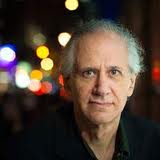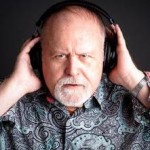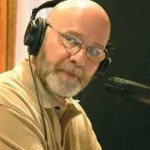WNYC/WQXR program host David Garland makes a good point, in reference to the announcement by WGBH (Boston) that it’s cutting back its nightly “Eric in the Evening”
jazz show, Steve Schwartz’s Friday night jazz show and  Bob Parlocha’s overnight jazz show. Writes Garland:  “I wish good radio was considered a good ‘story’ while it’s ongoing, not only when it’s cancelled.”
Journalists love conflict — it’s hard to make something that’s positive and ongoing dramatic. So it’s probably in the scheme of things that radio programs that continue to provide high quality pleasure to loyal listeners year after year don’t attract much frequent attention. But fair enough –Â and here’s some nice news: WBGO (Newark) is celebrating the 40th anniversary of program host Michael Bourne on the air, and the 30th anniversary of music director and Morning Jazz host Gary Walker’s launch of his radio career.
Bourne, who is host of Singers Unlimited, Afternoon Jazz  and The Blues Hour on WBGO Jazz 88.3, and will broadcast live from the Montreal Jazz Festival on Sunday July 1, 10:00 am – 2:00 pm and Monday, July 2 – Wednesday, July 4, 2:00 pm – 6:30 pm. He’s heard on the radio at 88.3FM and worldwide on the web at www.wbgo.org.
Walker, like Bourne and Garland and most of the other radio broadcasters I know, got his start at his college radio station and has not stopped.
(Tangent, disguised as full disclosure: I produce arts segments for NPR, and once had a weekly show on the radio station of my high school, New Trier East, where I broadcast “Little Suite” from Roscoe Mitchell’s album Sound. A listener within the station’s tiny range called to tell me about Eli’s Chosen Six, the avant-garde Dixieland band of Yalies including trombonist Roswell Rudd and bassist Buell Neidlinger — I borrowed that lp and played it on my show the next week. And I grew up listening to Chicago’s WVON (“Voice of the Negro,” though it was owned by the Chess brothers), as well as WLS and WCFL (which at the time mixed hits from Aretha, the Temps, Tops, Otis Redding, Wilson Pickett with the Beatles, Stones, Animals, Spoonful, Airplane, Turtles, Doors, Rascals, Hendrix, Simon & Garfunkel, Laura Nyro . . . Commercial radio then sure was swell).
In the digital age one wonders if there would still be terrestial radio as it’s existed since the 1920s if people didn’t listen in their cars. There are a lot of attractive online platforms competing for ears’ attentions. Sadly for those who crave human contact, the digital platforms offer music but no djs, who fostered a sense of community among listeners. But that leads to an interesting comment posted on Ed Bride’s insightful article about the WGBH debacle by the supremely talented radio producer Bobby Jackson, formerly at
WCLK-Atlanta and WCPN-Cleveland, now distributing his own show Roots of Smooth in 16 U.S. markets and on the web:
There is a much more at work here. This is about systematic oppression from privileged board room members who make the decisions about the relevance of African-American culture on the radio. I would venture to say that there aren’t many people of color at those tables who are making these decisions. . . The elimination of jazz on other public radio stations have not helped their numbers. In fact, in many situations, these behind closed doors, board room decisions have put the stations at odds with many supporters in their communities; supporters who have left their ranks. . .I am incensed that African-American music and culture continues to be marginalized and is the first to be thrown under the bus when there is a “financial” crisis. . .One of the reasons public radio exists in the first place was to give voice to the voiceless over the airwaves. There is a rich history surrounding what we do that speaks to affirmation of the true melting pot that America is suppose to be. It is a model on display to share; for all to learn from, how we are able to come together under the magic of jazz, a music that originated in the African-American and is now shared not just here in the United States, but the world over. It is insane that it is being taken off the shelf in so many places in its place of birth.
It may be an unintended consequence of financial strategies that the music which used to be so easily, cheaply accessible to Americans of every background and economic strata is now being relegated to an ever-more-obscure niche. But even if it’s unintended, it’s real. And Bobby is so right — public radio was instituted to be a voice for the otherwise unheard public. Non-commercial radio is supposed to have a mission beyond accruing profits.
Come on, WGBH — be a leader in public broadcasting, end the pernicious trend. Use the airwaves to promote great American music that has the potential to appeal to everybody. So it costs a few bucks to keep informed djs on the air — make that point in your fund-drives. Be a job sustainer, if not a job creator. Realize that Boston needs and wants “Eric in the Evening,” Steve and Bob, and will not flock to hear more talk-news but will tune-in for jazz.




